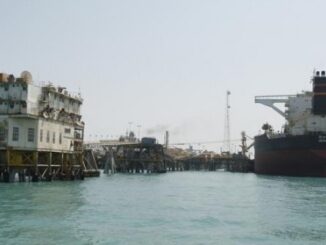
In a move that has reignited concerns over maritime security in one of the world’s most critical energy chokepoints, Iran’s Islamic Revolutionary Guard Corps (IRGC) confirmed on Saturday that it had seized the Marshall Islands-flagged oil tanker Talara in the Strait of Hormuz.
The incident, which occurred on Friday, November 14, 2025, marks the first confirmed seizure of a commercial vessel by Tehran since its clashes with Israel and the United States in June 2025.
Details of the Incident
The Talara, operated by the Cyprus-based Columbia Shipmanagement, was en route from a port in the United Arab Emirates (UAE) to Singapore when it was intercepted.
According to tracking data and reports, the tanker deviated from its course in the Gulf of Oman near Khor Fakkan on the UAE coast before entering the Strait of Hormuz, where Iranian forces boarded it.
Three IRGC vessels were involved in the operation, which was monitored overhead by a U.S. Navy MQ-4C Triton drone.
The U.S. Navy’s Bahrain-based 5th Fleet stated it was actively monitoring the situation but provided no further details on immediate responses.
The tanker was carrying a cargo of high-sulfur gasoil, a type of fuel oil often used for marine bunkering or industrial purposes.
Other reports describe the cargo as petrochemicals, highlighting the vessel’s role in transporting refined products rather than crude oil.
The oil was loaded at a UAE port, indicating the United Arab Emirates as the country of origin for the shipment.
Its destination in Singapore suggests potential end-users in the Asian market, where Singapore serves as a major hub for oil trading, refining, and bunkering. Specific customers involved in the transaction have not been publicly disclosed, but the route points to involvement from UAE exporters and Singapore-based traders or refineries.
Iran’s IRGC justified the seizure by claiming the tanker was carrying an “unauthorized cargo” in violation of the law, describing it as an “illegal consignment” under a judicial order.
No further elaboration on the nature of the violation was provided, and details about the crew’s status or the tanker’s current location remain unclear.
Columbia Shipmanagement reported losing contact with the vessel on Friday morning, prompting alerts from maritime monitoring agencies.
Geopolitical Context
The Strait of Hormuz, a narrow waterway connecting the Persian Gulf to the Gulf of Oman, is a vital artery for global energy supplies. Approximately one-fifth of the world’s oil shipments pass through this chokepoint, making any disruption a potential threat to international energy markets.
Iran’s control over the strait gives it significant leverage in regional disputes, and Tehran has previously warned of targeting commercial shipping in response to Western sanctions and military pressures.
This seizure comes amid ongoing tensions between Iran and the West. It follows Iran’s April 2024 capture of the Portuguese-flagged MSC Aries, which was linked to Israeli interests, and a series of Houthi attacks on shipping in the Red Sea backed by Iran.
In May 2022, Iran held two Greek tankers for months to secure the release of its own seized vessel, illustrating a pattern of retaliatory actions.
The presence of a U.S. drone during the operation underscores heightened U.S. surveillance in the region, particularly after recent escalations involving Israel.
Analysts suggest this could be a signal from Iran amid broader geopolitical shifts, including potential changes in U.S. policy under incoming administrations.The United Kingdom Maritime Trade Operations (UKMTO) has urged vessels in the area to transit with caution and report any suspicious activity, reflecting immediate concerns for shipping safety.
Real-time discussions on platforms like X (formerly Twitter) echo these worries, with users highlighting the tanker’s route and cargo details while speculating on market impacts.
Implications for Global Energy MarketsWhile no immediate disruptions to oil flows have been reported, incidents like this historically contribute to volatility in energy prices. High-sulfur gasoil, the tanker’s cargo, is a key component in the global fuel market, and any prolonged detention could affect supply chains in Asia. The UAE, as a major OPEC+ producer, exported significant volumes of refined products in 2025, with Singapore absorbing a portion for redistribution. If escalated, this could prompt rerouting of tankers, increased insurance premiums, and upward pressure on oil benchmarks like Brent crude.
Energy News Beat will continue monitoring developments, as this event underscores the fragility of global energy security in geopolitically sensitive regions. For now, markets appear stable, but stakeholders should prepare for potential ripple effects.







